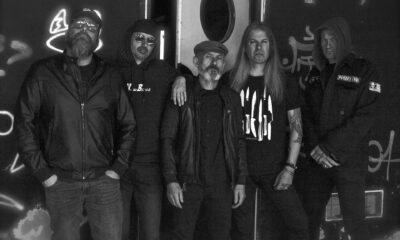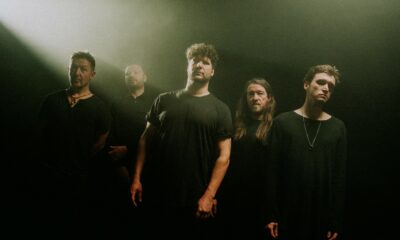Interviews
Interview with Melechesh lead vocalist and guitarist Ashmedi
Ashmedi, vocalist and guitarist with Melechesh spoke with me recently about the band’s latest release, The Epigenesis. The group originally formed in Jerusalem and eventually relocated to The Netherlands. Their sound is very unique in the metal world as they combine thrash, death and black metal with a Middle Eastern influence, the result of which is quite stunning. It is not everyday you can hear sitars on an extreme metal record, but that is exactly the kind of thing you will find on The Epigenesis.

Ashmedi, vocalist and guitarist with Melechesh spoke with me recently about the band’s latest release, The Epigenesis. The group originally formed in Jerusalem and eventually relocated to The Netherlands. Their sound is very unique in the metal world as they combine thrash, death and black metal with a Middle Eastern influence, the result of which is quite stunning. It is not everyday you can hear sitars on an extreme metal record, but that is exactly the kind of thing you will find on The Epigenesis. Yes this disc is heavy and punishing, but there are also unexpected surprises waiting around every corner. Here is what Ashmedi had to say about the band and their new CD.
How are you doing today? Are you in the States?
Ashmedi: No, I am in Amsterdam.
I am talking to you all the way from Amsterdam, wow, it is crystal clear.
Ashmedi: Yeah. I am in Amsterdam.
I knew you guys had relocated to Europe but I didn’t realize you were in Amsterdam.
Ashmedi: 12 years already. I left in ’98. We did our first album there and then we ended up leaving.
You like it over there?
Ashmedi: Well, yes and no. I mean it is a charming place, very easy going. But it is small so I get bored.
Now that your new CD, The Epigenesis has been released. How do you feel about it and are you satisfied with the outcome?
Ashmedi: Well, the album turned out exactly how I wanted it to sound. It is organic, it sounds good and we have great artwork and had good photo sessions, so it turned out exactly how I wanted it to. The feedback has been great as well. In Europe we have had several cover stories and now the fans are starting to buy it so it is going good.
What was the writing process like for this disc? Did you guys all write together or was it more the efforts of one particular member of the band?
Ashmedi: I write most of the songs, guitars and the drums and then I make demos for my drummer. I do most of the effort and then we meet altogether and go through the music.
I was reading online that you guys went to Istanbul to record this record. Is that correct?
Ashmedi: Yeah.
How did you decide to record there?
Ashmedi: Well you know our music is like East meets West. It is like heavy metal, thrash metal, black metal with Eastern melodies. We have been in Amsterdam for so long and we have recorded in Sweden, Germany and Holland. We have had offers to record in The States, the UK and Norway. They told us we could record anywhere that we wanted, we told them we wanted to go to Turkey. The city itself is very historical. It is literally on two continents, it is on the European continent and the Asian continent. The place is just perfect, they love music and it is very inspirational when it comes to architecture. It is very heavy as well.
There is a heavy metal scene over there?
Ashmedi: It is huge. Compared to Europe I saw a record number of heavy metal bars and rock bars as well. Very nice decoration and you are there with style. When I was recording there Rob from Anthrax was kind enough to put me on the guest list and I saw the Big Four, I left the studio to go see them in Istanbul. A week later there was a festival with Overkill and everybody and I just hung out with them all. It has a scene yeah.
As I do these interviews and talk to different bands I am finding out there is a scene all over the world, even in places like India and South Africa.
Ashmedi: Everywhere listen heavy metal is everywhere it transcends. South Africa is excellent but it (metal) is in Ghana and Kenya. It is everywhere. Oddly enough most head bangers around the world are pretty much similar. We all share the same subculture which is the metal subculture. Which transcends our original cultures.
Are there any personal favorites on the record or tracks that have good stories behind them?
Ashmedi: For me that would be like choosing between my children. I don’t have any… as far as I know. I like “Ghouls Of Nineveh,” “Sacred Geometry,” “The Greater Chain Of Being” and “The Epigenesis.”
I love the break in the middle with the whole sitar Middle Eastern flair to it.
Ashmedi: Yeah, “When Halos And Candles Collide.”
That is a great tune.
Ashmedi: It is isn’t it? It has a twelve string electric guitar improvising with a new approach, it is an Indian guitar scale and then I play the sitar on top of it and it worked.
I think it works really well because it breaks up the heaviness right there in the middle.
Ashmedi: Exactly the whole album is kind of like an epic journey or a long roller coaster ride with different themes coming at you. You need that break; you have to breathe before you can continue.
What kind of touring do guys have planned in support of the record?
Ashmedi: First of all in Europe we will be doing mini tours. After that we are going to be touring Europe with Nile and then after that we will be touring the States with Rotting Christ.
You guys are going out with Nile? That is a good match.
Ashmedi: It is isn’t it. The reaction has been great to this and the fans are very happy about it. We are making this an epic tour. I look forward to this tour.
You guys have been at this for quite a while, since ’93 I believe. Did you ever imagine you would still be doing this?
Ashmedi: No, and whenever I thought about it I didn’t want to confront myself, like what am I going to do. I have an MBA and I used to be an A&R manager at EMI/Capitol Virgin in the Netherlands. My guitar player has his PHD in Political Science as well. What I am trying to say is I have turned down a lot of good paying jobs just to play heavy metal and I am still doing it.
Yeah it is 17 years later and you are still putting out solid relevant music.
Ashmedi: Our philosophy is to create and not recreate and we are doing the best we can literally. Melechesh to us is about that ability.
Any closing words at all?
Ashmedi: I just appreciate this interview, this is really cool and I hope to see you when we get to the States.
-

 Music6 days ago
Music6 days agoTake That (w/ Olly Murs) Kick Off Four-Night Leeds Stint with Hit-Laden Spectacular [Photos]
-

 Alternative/Rock7 days ago
Alternative/Rock7 days agoThe V13 Fix #010 w/ High on Fire, NOFX, My Dying Bride and more
-

 Alternative/Rock2 weeks ago
Alternative/Rock2 weeks agoA Rejuvenated Dream State are ‘Still Dreaming’ as They Bounce Into Manchester YES [Photos]
-

 Features5 days ago
Features5 days agoTour Diary: Gen & The Degenerates Party Their Way Across America
-

 Culture1 week ago
Culture1 week agoDan Carter & George Miller Chat Foodinati Live, Heavy Metal Charities and Pre-Gig Meals
-

 Music1 week ago
Music1 week agoReclusive Producer Stumbleine Premieres Beat-Driven New Single “Cinderhaze”
-

 Alternative/Rock1 week ago
Alternative/Rock1 week agoThree Lefts and a Right Premiere Their Guitar-Driven Single “Lovulator”
-

 Alternative/Rock2 weeks ago
Alternative/Rock2 weeks agoDeath Wishlist Are Fiery and Fierce with Their “I Get Bored” Video Premiere












